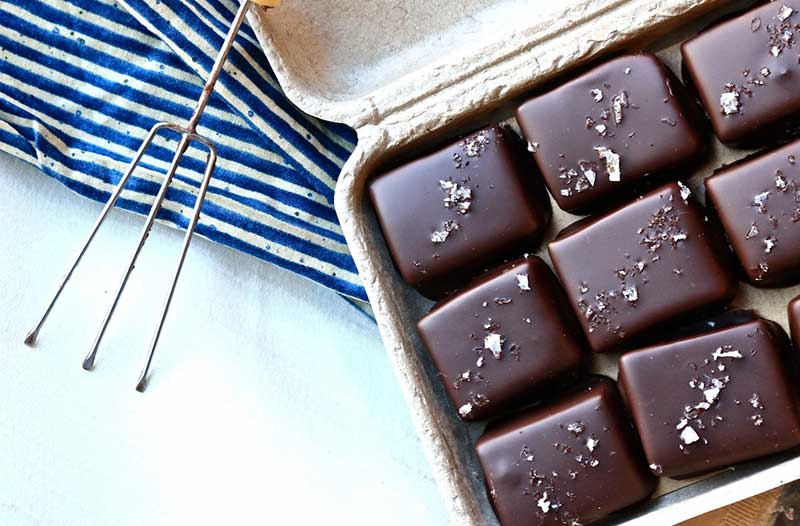
February Featured Vendor – Farmhouse Chocolates

How did you get into chocolate making?
After leaving a life of dairy farming, co-owner and head chocolatier Erlé LaBounty has been crafting delicately balanced, old-world chocolate confections–such as his hand-rolled truffles– out of his native Vermont since he was 16. In 2001, he graduated from the New England Culinary Institute and embarked on internships in Alaska, New York, and Italy before gaining culinary positions in Woodstock, Waterbury, and Middlebury Vermont. Erlé’s life and business partner, Eliza La Rocca, came to Vermont in 2010, after working in Florence, Italy’s specialty food market, Il Mercato Centrale, and leading food and wine tours in Italy. Eliza has worked on vineyards in Italy, France, and Vermont, and soon made it her business to turn her husband’s longstanding part-time passion into full-time work for them both.
How has your business evolved?
For over 15 years, LaBounty operated the company (then called Farmhouse Truffles) by himself in addition to full-time pastry and restaurant work. When LaBounty and La Rocca met, she started helping out. Gradually, La Rocca brought on new wholesale accounts, redesigned packaging, and started applying for farmers’ markets and festivals. In 2014, LaBounty left his full-time baking position for self-employment, and the couple added a dark chocolate vegan sorbet to their list of offerings. In 2015, La Rocca started working full time in the business and tried her hand at ice cream making. They took out their first business loan for all of the equipment necessary to produce, transport, and serve ice cream and sorbet. Thus began a five-year learning curve of creating custom recipes and processing from scratch, even pasteurizing the ice cream base. The couple transitioned to the name Farmhouse Chocolates & Ice Cream, and mid-way through the market and festival season in 2016, they established their own production facility in part of a newly refurbished building in Bristol, VT. During this period, they generally worked 6.5-7 days a week, juggling the production, administrative, and other logistical aspects of these various sales outlets.
In 2018, an opportunity came up for LaBounty and La Rocca to “try on” brick and mortar retail. It was a fantastic opportunity before investing $30-40k into building out a space. “It allowed us to see which way forward was right for us, not just right on paper.” As a result, they decided to find a way to get out of ice cream all together. Their mantras became “let go to grow” and “focus to flourish,” returning to their chocolate roots, creating space for greater efficiency, profit, and creativity within that focus.
By March 2020, Eliza will cease ice cream and sorbet production completely. Goals for the future include a more diverse selection of organic, dark chocolates available in their factory store and online, a more focused approach to wholesale and distribution, and possibly bean to bar experiments. “It’s not going to happen overnight,” says La Rocca. “But we’ve got clear goals, and we’re excited and relieved.”
What is your guiding philosophy, and how do you embody it?
Our company’s ethos centers on the meeting of responsibility and pleasure. Sourcing organic, fair trade, and local ingredients, we carefully craft dark chocolate confections that emphasize taste, texture, and aesthetics, as much as they do sustainability and purity of ingredients–values also reflected in our environmentally friendly packaging and small batch production
What are some of the challenges you have faced along the way?
Beyond making the actual products (which is why we got into it), we wear a ton of hats, some of which don’t come naturally to us and have been a huge learning curve. Without a background in business, marketing, sales, or design, it’s an uphill journey. It’s necessary to find positive and meaningful ways to communicate the value of our products. Food production has very real costs. Our equipment is expensive; our local and organic ingredients are expensive, and there are other hidden costs people don’t often think about. Commercial food production is nothing like making food as a hobby or at home. I no longer look at other products and think, “why do they charge so much?” Convincing people that our chocolate really is worth X dollars, in an industry where everyone is using catchphrases like “small-batch,” “all-natural, ” and “finest quality” is an ongoing challenge. That can feel defeating at times, so I force myself to take a step back so I can see our progress and evolution as a company–imperfect and glacially slow though it seems. We also always make room for laughter at work. It’s the secret ingredient to working with your spouse.
Tell me about the ingredients you use.
We use certified organic, fair-trade dark chocolates (different percentages) with no added emulsifiers whatsoever (no soy or sunflower lecithin). We source local cream and butter and use organic cane sugar and organic tapioca syrup. The herbs and fruits we use are local and/or organic. We aim to walk the walk.
What would you like the world to know about your chocolates?
The chocolates are where we shine. I mean, the ice cream is amazing, too, but we’re getting out of that. We keep going and reinventing ourselves because we think the food supply chain can and should be both ethical and delicious. Discipline, passion, and creativity are what drive us. Flavor development and product ideas are the most fun part of the job.
